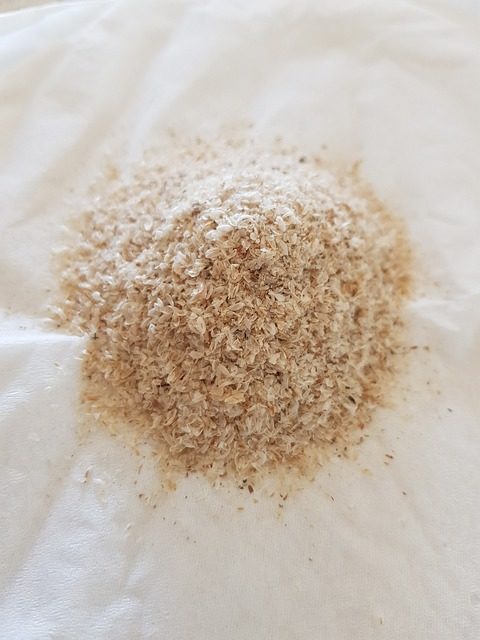Are you seeking a natural and effective way to improve your digestive health, heart health, and blood sugar management? Look no further! Psyllium, a soluble fiber derived from the seeds of the Plantago ovata plant, offers a plethora of health benefits that can help you reach your wellness goals. In this blog post, we will explore the origins, nutritional value, health benefits, and various forms of psyllium, guiding you through the process of incorporating this powerful plant-based fiber into your daily routine.
Table of Contents
Short Summary
Psyllium is a plant-based soluble fiber with impressive nutritional benefits and potential health effects on cholesterol, blood sugar levels, digestion and heart health.
Consult healthcare provider prior to taking psyllium for safety & interactions. Start with minimal dosage of 5-10 grams daily taken before meals.
Incorporate into diet through food sources or quality supplements certified by third party certifying bodies.
Understanding Psyllium: Origins and Nutritional Value

Psyllium is a plant-based soluble fiber derived from the seeds of the Plantago ovata plant, which is predominantly cultivated in India. It is highly valued for its impressive nutritional profile, which includes a rich source of carbohydrates and fiber, with minimal fat, protein, cholesterol, saturated fat, and sodium.
Psyllium is available in two primary forms: psyllium seed husk and psyllium husk powder. Each form offers unique benefits and can be incorporated into your diet to support various health goals.
Psyllium Seed Husk
Psyllium seed husk is the outer coating of the psyllium seed, which is teeming with soluble fiber and commonly used in supplements and food products. Research suggests that psyllium seed husk can provide relief from constipation and diarrhea, lower cholesterol levels, and regulate blood sugar levels in individuals with diabetes. It may also help to reduce glycosylated hemoglobin significantly, which is an essential marker for long-term blood sugar control.
However, before taking psyllium seed husk, it is crucial to consult with a healthcare provider, as there are known interactions with certain medications, such as blood thinners, diabetes medications, and cholesterol-lowering drugs.
Psyllium Husk Powder
Psyllium husk powder, on the other hand, is a finely ground version of the seed husk, offering a more concentrated source of fiber and making it easier to incorporate into recipes. This versatile form of psyllium can aid in cholesterol reduction, relief from constipation and diarrhea, and the treatment of irritable bowel syndrome, hemorrhoids, and other intestinal issues.
Psyllium husk powder is available in both capsule and powder form, with the latter providing greater versatility for inclusion in various recipes and dishes. The suggested dosage for psyllium husk powder is 1-2 teaspoons per day.
Like psyllium seed husk, it is essential to be aware of potential side effects and allergic reactions, such as bloating, gas, and abdominal discomfort, as well as rare occurrences of hives, difficulty breathing, and swelling of the face, lips, tongue, or throat.
Health Benefits of Psyllium Fiber

Regular consumption of psyllium fiber, a type of dietary fiber, has been associated with a multitude of health benefits, including improved digestion, heart health, cholesterol levels, constipation relief, and gut health. These benefits can be attributed to the unique properties of psyllium fiber, which acts as a bulk-forming laxative that absorbs water in the digestive tract and forms a gel-like substance, promoting regular bowel movements and overall digestive health.
In the following subsections, we will delve deeper into the specific benefits of psyllium fiber for digestive health, heart health, and blood sugar management.
Digestive Health
Psyllium fiber has been found to promote regular bowel movements, relieve constipation and diarrhea, and potentially reduce symptoms associated with irritable bowel syndrome (IBS) and inflammatory bowel disease. By acting as a water-absorbing agent, psyllium can increase stool thickness and slow its passage through the colon, making it an effective treatment for diarrhea.
Additionally, as a bulk-forming laxative, psyllium can assist with regularity and support overall digestive health, making it an invaluable addition to any healthy diet focused on maintaining optimal digestive function.
Heart Health
Psyllium fiber can do wonders for your heart health. Studies have shown that it can effectively lower cholesterol levels, reduce blood pressure, and decrease the risk of heart disease. By binding to cholesterol and bile acids in the digestive system, psyllium prevents their reabsorption and promotes their excretion from the body, thereby lowering cholesterol levels and reducing the risk of heart disease.
With these impressive cardiovascular benefits, incorporating psyllium into your daily routine can be a simple yet powerful way to support a healthy heart.
Blood Sugar Management
For individuals with type 2 diabetes, psyllium fiber can play a significant role in blood sugar management. Research has shown that psyllium fiber can improve glycemic and lipid control in individuals with type 2 diabetes, sustain healthy blood sugar levels, and lower postprandial serum glucose and insulin concentrations. In fact, psyllium decreased serum glucose in several studies, making it a valuable addition to a diabetic’s diet.
Moreover, psyllium fiber can help regulate glucose levels in the blood by slowing its entry following meals, contributing to the maintenance of healthy blood sugar levels. To effectively balance blood sugar, it is suggested to consume one scoop of psyllium powder mixed in 8 oz of water 15-30 minutes prior to eating.
For more info, visit 8 benefits of psyllium husk.
Psyllium Supplementation: Forms and Dosage
Psyllium supplements come in various forms, such as capsules, tablets, wafers, and powders, providing options to suit individual preferences and health goals. The recommended dosages for these supplements vary based on factors such as individual needs, health goals, and the specific form of psyllium being consumed.
It is generally recommended not to exceed the dosage provided by the manufacturer and to take supplements prior to a meal mixed with an 8-ounce glass of water or juice. In the following subsections, we will further explore the different forms of psyllium supplements and their respective dosages.
Available Forms
Psyllium supplements, a popular type of fiber supplements, are available in multiple forms, including powders, capsules, and thins, catering to individual preferences and usage requirements. Each form differs in terms of concentration, absorption rate, and ease of incorporation into recipes and daily routines.
Psyllium can also be found in dry seed or husk form, incorporated in certain commercially-prepared laxatives, and in capsules, tablets, and wafers. By understanding the distinctions between these forms, you can select the most suitable psyllium supplement for your needs and lifestyle.
Recommended Dosage
Dosage recommendations for psyllium supplements vary, but generally range from 5-10 grams daily, taken before meals with plenty of water. To ensure optimal results and minimize potential side effects, it is advisable to start with a minimal dose and incrementally increase it as necessary.
For those seeking relief from constipation, research suggests a daily dose between 5 and 10 milligrams (mg). The optimal time to take psyllium is either first thing in the morning or before bedtime, depending on individual preferences and routines.
Potential Side Effects and Allergic Reactions
While psyllium offers numerous health benefits, it is essential to be aware of potential side effects and allergic reactions. Some individuals may experience mild side effects such as gas, bloating, diarrhea, nausea, and stomach pain. Constipation lasting longer than 7 days, rectal bleeding, or severe stomach pain may also occur and warrant medical attention.
Psyllium is not recommended for individuals with esophageal stricture or any other narrowing or obstruction of the gastrointestinal tract, and those with kidney disease should consult their doctor before taking psyllium, as these conditions can be metabolic syndrome risk factors.
In rare cases, severe allergic reactions may occur, which we will explore in more detail in the following subsections.
Common Side Effects
Common side effects of psyllium supplementation include gas, bloating, and cramping, which can be minimized by gradually increasing fiber intake and allowing the body time to adjust. It is important to closely monitor your body’s response to psyllium and adjust your dosage accordingly to ensure the most comfortable and effective experience.
If you encounter persistent or severe side effects, it is crucial to consult with a healthcare professional for guidance on proper usage and potential alternatives.
Rare Allergic Reactions
Severe allergic reactions to psyllium are rare, but can include symptoms such as difficulty breathing, hives, and swelling of the face, lips, tongue, or throat. In extreme cases, anaphylaxis, a life-threatening allergic reaction, may occur.
If you experience any signs of a severe allergic reaction, seek immediate medical attention. It is crucial to discuss any potential allergies or sensitivities with your healthcare provider before starting psyllium supplementation, to ensure your safety and well-being.
Psyllium Interactions with Medications
Psyllium can affect the absorption and efficacy of certain medications. It is important to be aware of their interactions. Therefore, it is essential to consult with a healthcare provider before starting psyllium supplementation, especially if you are taking other medications.
In the following subsections, we will discuss specific medication interactions and the importance of consulting with a healthcare provider to ensure the safe and effective use of psyllium.
Specific Medication Interactions
Psyllium may interact with medications such as antidepressants, cholesterol-lowering drugs, diabetes medications, and others, potentially affecting their absorption and effectiveness. To avoid potential interactions, it is advised to take psyllium supplements at least two hours apart from other medications.
By being aware of these interactions and discussing them with your healthcare provider, you can ensure the safe and proper use of psyllium in conjunction with your current medications.
Consultation with Healthcare Provider
It is crucial to discuss potential psyllium interactions with a healthcare provider before starting supplementation to ensure safety and proper usage. Your healthcare provider can help you determine the appropriate dosage and form of psyllium for your individual needs and health goals, as well as provide guidance on potential interactions with your current medications.
By taking this proactive approach, you can confidently incorporate psyllium into your daily routine without jeopardizing your overall health.
Incorporating Psyllium into Your Diet
Psyllium can be incorporated into your diet through various food sources or by choosing quality supplements tested by reputable third-party certifying bodies, such as USP, ConsumerLabs, or NSF International. By adding psyllium to your diet, you can enjoy the numerous health benefits it offers, including improved digestion, heart health, and blood sugar management.
In the following subsections, we will explore different food sources of psyllium and provide guidance on selecting quality supplements.
Food Sources
Psyllium is found in various food products, such as cereals, bread, and baked goods, as a thickening agent or to increase fiber content. In addition to these products, psyllium can also be added directly to foods such as soups, yogurt, or smoothies, providing an easy and versatile way to incorporate more fiber into your diet.
By adopting a diet rich in psyllium-containing foods, you can support your overall health and well-being while enjoying a diverse and delicious array of dishes.
Choosing Quality Supplements
When selecting psyllium supplements, it is essential to look for products that have been tested by reputable third-party certifying bodies, such as USP, ConsumerLabs, or NSF International, to ensure purity and quality. By choosing a supplement that meets these stringent standards, you can trust that the product contains the accurate amount of psyllium and is free from contaminants.
Additionally, examine the label for information on purity and the source of psyllium, and consider whether you prefer a supplement that includes the seeds for more insoluble fiber content.
Summary
In conclusion, psyllium is a powerful plant-based fiber that offers numerous health benefits, including improved digestion, heart health, and blood sugar management. By understanding the origins, nutritional value, and various forms of psyllium, as well as potential side effects, medication interactions, and how to incorporate it into your diet, you can confidently harness the power of this natural wonder for your well-being. So why not take the first step towards a healthier you and explore the world of psyllium today?
Frequently Asked Questions
Is it OK to take psyllium fiber everyday?
Psyllium is a safe and gentle laxative, and it is okay to take it every day.
Fiber supplements such as psyllium are beneficial to the body and can help prevent constipation.
What foods are high in psyllium fiber?
Psyllium is commonly found in many health foods such as bran, oats, barley, and legumes, making them a great source of fiber.
Psyllium husks are also available to add extra dietary fiber to any dish.
What is the difference between psyllium and Metamucil?
Psyllium husk is gentler on the stomach and more effective in relieving constipation than Metamucil, as it does not contain artificial ingredients.
What is the best form of psyllium to take?
For constipation relief, the powder or husks/hulls form of psyllium are the best options. Both types of psyllium will provide the same results, with some people preferring the finer texture of the powder.
Psyllium is a natural fiber that helps to soften stools and increase the frequency of bowel movements. It is a safe and effective way to treat constipation, and it is available in both powder and tablets.
What is psyllium?
Psyllium is a soluble fiber derived from the seeds of the Plantago ovata herb, mainly grown in India. It’s known for its many health benefits and is commonly used as a natural laxative.
Psyllium is a great addition to any diet, as it can help regulate digestion, reduce cholesterol levels, and even aid in weight loss. It can also be used to help relieve constipation.









